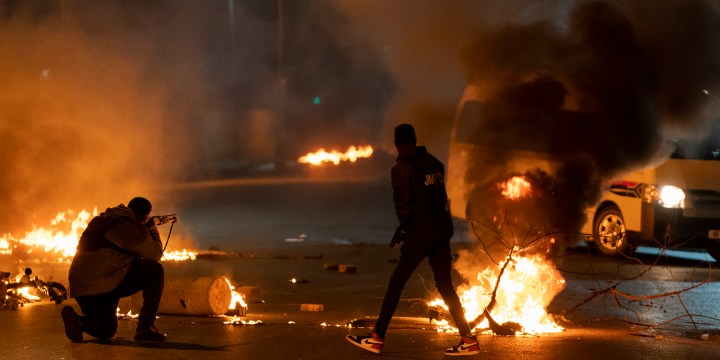GROUNDUP: AGE OF ANARCHY
Explainer: Declaring a State of Emergency in South Africa

Some people have been calling for a State of Emergency to be declared because of civil unrest in the country.
First published by GroundUp.
Civil unrest in KwaZulu-Natal and parts of Gauteng has resulted in some people calling for a state of emergency to be declared under the State of Emergency Act. Here we explain what it is and how it is declared.
Under the State of Emergency Act the government invokes temporary emergency powers meant to restore peace and public order. The Constitution sets out three requirements for the declaration of such a state of emergency:
- It must be declared in terms of an Act of Parliament;
- The life of the nation must be threatened by war, invasion, general insurrection, disorder a natural disaster or other public emergency; and
- It must be necessary to restore peace and order.
According to the Act, the president can declare a state of emergency in the country (or part of the country) by publishing a notice in the Government Gazette. Brief reasons for why it is necessary must be set out in the notice.
The president then has broad powers to make any emergency regulations that are “necessary” to restore peace and order. This would include, for example, the power to make regulations that restrict freedom of speech or movement, or which prohibit workers from going on strike. It would also allow the president to make regulations that authorise the police (or the army) to arrest or detain people without a warrant, or to intercept private communications without a court order.
If it becomes necessary to do so, the president would probably also be able to make emergency regulations on other issues. For example, the amount of petrol, food or medicine that people can purchase while the state of emergency remains in force could be restricted.
The State of Emergency Act requires that any such emergency regulations be published in the Government Gazette. The president must also take appropriate steps to ensure that the public knows the contents of any regulations. For example, by publishing the regulations on social media or by informing the public of the regulations through radio or television advertisements.
The State of Emergency Act also allows the president to authorise other people, such as a cabinet minister or the National Commissioner of Police, to make emergency rules or by-laws.
This does not, however, mean the power to make emergency regulations or rules is unlimited. Certain constitutional rights cannot be limited or infringed under a state of emergency. For example, the right to life and human dignity cannot be limited at all. Other constitutional rights that cannot be limited or infringed during a state of emergency include the right to not be subjected to torture, slavery or forced servitude.
Another restriction is that any regulation or law which limits a constitutional right during the state of emergency must be strictly necessary and must also be consistent with international law. The Constitution also prohibits the government from passing any regulation or law which gives indemnity to the state or other person for unlawful acts performed during a state of emergency.
In addition, the Act requires that every emergency regulation or by-law be “necessary” to restore peace and public order. Any regulation or by-law which is not “necessary” could therefore be challenged in court as unlawful.
The Constitution also sets out certain rights for any person detained without trial, for example, among other things, they must be allowed to be visited by a lawyer. Their name and place of detention must be published in the Government Gazette within five days of their arrest. Their detention must be reviewed by a court as soon as reasonably possible and this must take place no later than ten days after their arrest.
If the president only declares a State of Emergency for a certain part of the country (for instance KwaZulu-Natal or Gauteng) emergency regulations or by-laws would only be valid in those geographic areas.
Notice declaring the state of emergency in part or all of the country must be tabled in the National Assembly for debate as soon as possible after its publication in the Gazette.
The state of emergency is only valid for 21 days. Parliament can then extend it for another three months, provided that 50% of the National Assembly votes in favour of the extension. Any subsequent three-month extension will require support of at least 60% of the National Assembly.
The Constitution also states that the National Assembly must first hold a public debate on any extension of a state of emergency before any vote to extend it will be legally valid.
The National Assembly can also pass a resolution “disapproving” of any emergency regulation, rule or by-law. If this occurs, the emergency regulation, rule or by law will be invalid.
The Constitution also states that a competent court can be approached during a state of emergency to give a judgment on the validity of the declaration of a state of emergency, its extension, and the enactment of any law or any decision taken under the state of emergency. DM



















 Become an Insider
Become an Insider
Comments - Please login in order to comment.